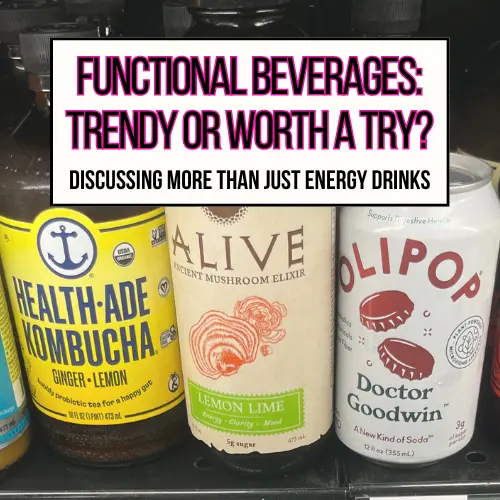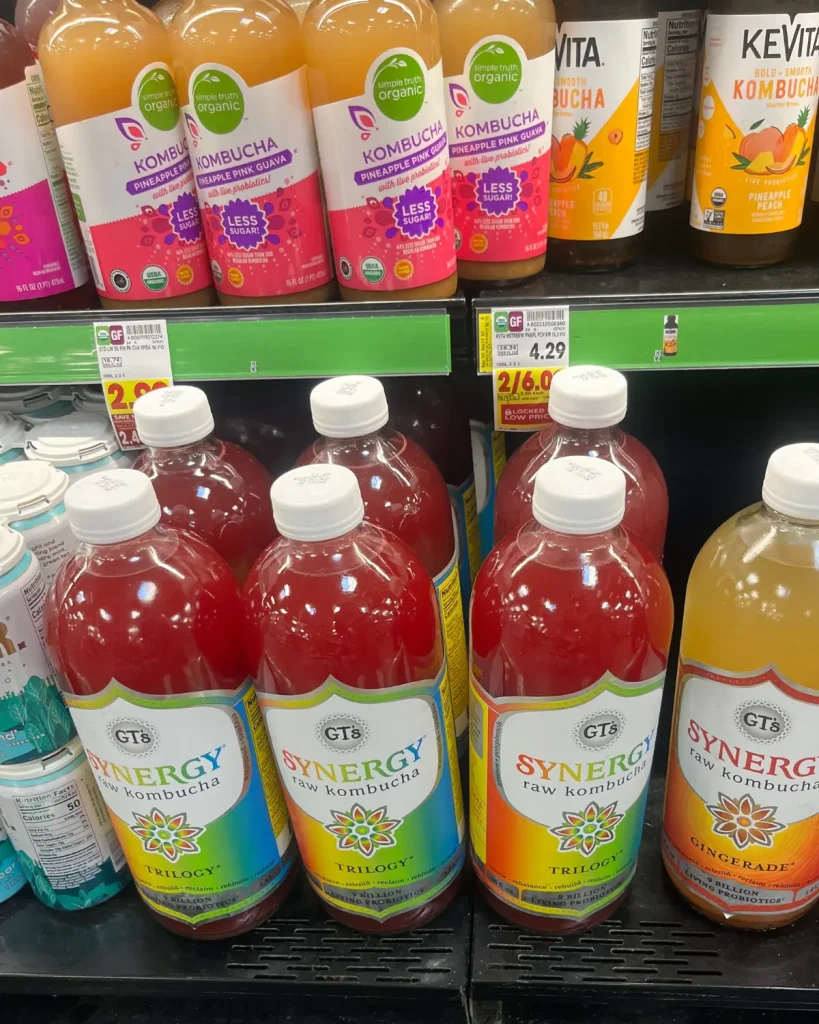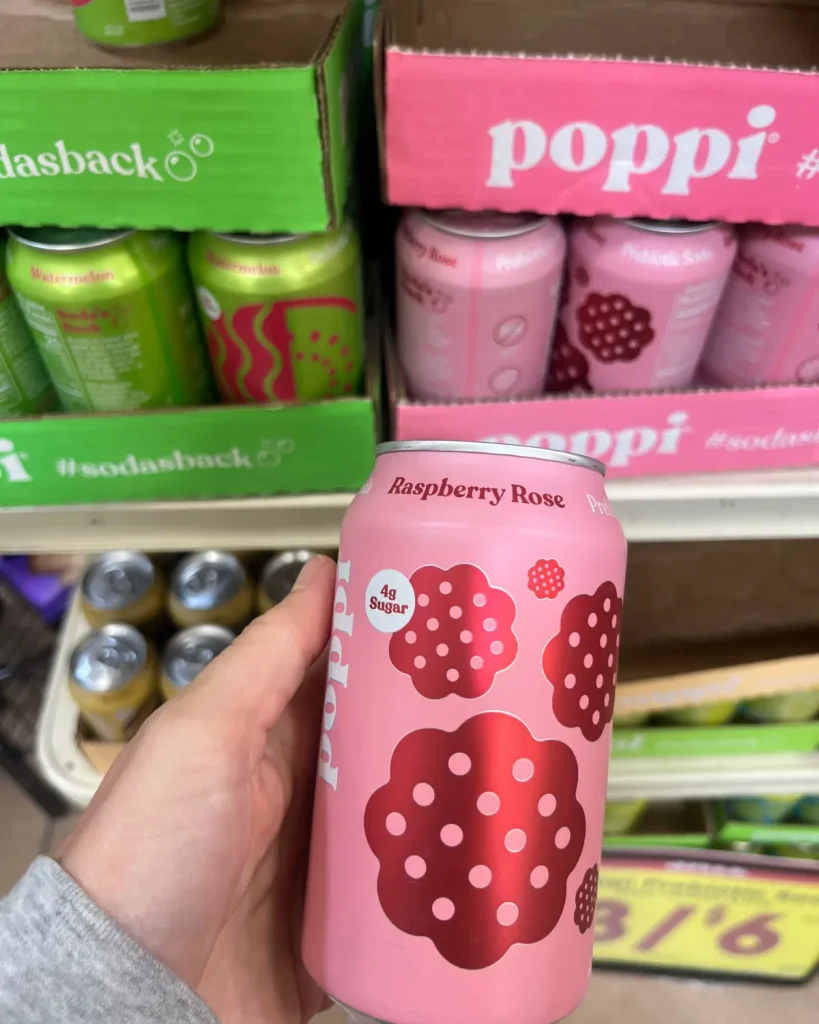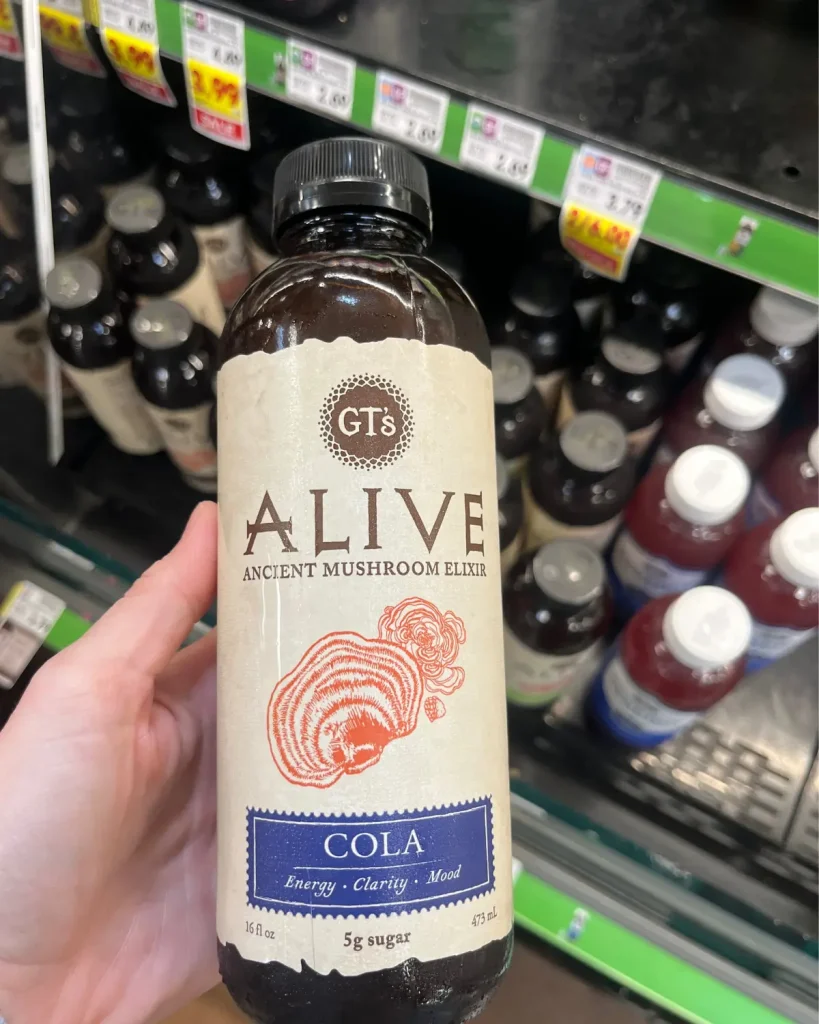The functional beverage industry has exploded over the past few years. While energy drinks have been around for quite some time, there are now numerous drink options that provide more than just energy – with claims like improved gut health and a better mood.

With more people limiting their alcohol intake and focusing more on wellness, these drinks are only increasing in popularity. Are these functional beverages worth the hype or are they just a trend?
Honestly, I do understand the draw to these drinks! It’s a convenient and tasty way to get additional health benefits without having to change your diet or take a supplement.
However, there are quite a few reasons why functional beverages aren’t all they are cracked up to be:
- They’re very expensive.
- These drinks are not well-regulated – so who is to say the ingredients listed are actually what’s in there?
- For the majority of functional beverages, the research regarding the proposed benefits is lacking.
- It’s more beneficial to consume a well-balanced diet.
So, let’s go over the different categories of functional beverages. I will also discuss which ones I would recommend and why! I mean, it’s summer and we are all looking for delicious drinks to keep us refreshed in the summer.
This post does contain Amazon affiliate links. At no additional cost to you, I receive a small compensation if a purchase is made.
Probiotic Drinks
Kombucha and kefir are considered “fermented foods” which provide our gut with good bacteria, or probiotics. There are many propose health benefits which in turn has led to an increase of clinical research examining these claims.
Kombucha is actually the most studied fermented food! There are many clinical trials backing up the health claims. A 2023 review of 15 studies suggests that kombucha consumption reduces inflammation and intestinal dysbiosis.

Kefir, a drinkable yogurt, has a significantly higher amount of live, active cultures when compared to yogurt. So yes, kefir is a great option for consumption of probiotics in the form of a beverage!
Now, there are even Kombucha sodas – which might be more palatable than drinking yogurt or the vinegar tasting kombucha. As long as they contain little sugar, I would give these drinks a go as a tasty alternative to just plain water.
So if there is one drink on this list that I would recommend, it’s probiotic drinks! I even made a gut health smoothie recipe that uses kefir (plus it’s creamy and delicious).

Summary of Probiotic Drinks
Probiotics and their effects on many diseases have not been fully investigated – and further research is needed. Do these drinks have a potential to provide health benefits? Sure! I am pro-fermented foods and why not drink it in a more palatable form, like a soda?
If you don’t love the taste of kombucha, try my light and refreshing kombucha mocktails.
Prebiotic Drinks
Prebiotics are plant fibers that our body cannot digest. They act as food for the good bacteria, stimulating growth and increasing the diversity of our gut microbiome.
Prebiotic drinks like Olipop and Poppi are low in sugar and loaded with these plant fibers. Olipop has 9 grams of fiber per can, while Poppi has 2 grams.

The downside? If you’re someone with a sensitive stomach, consuming large amounts of fiber (especially in the form of inulin) can lead to bloating and abdominal pain.
Olipop has an interesting list of ingredients including chicory root, cassava root, Jerusalem artichoke. If your body isn’t used to so much fiber, it’s best to stick to start low and go slow – and not drink more than one can per day. Inulin can cause digestive distress in those with irritable bowel syndrome.
Try my Dirty Soda Recipes with Olipop to elevate your average soda with fun and refreshing flavors.
Summary of Prebiotic Beverages
I mean, if you’re craving a carbonated beverage – why not one with a little extra fiber in it? And if that fiber happens to improve your gut microbiome – even better!
However, these sodas should not be used in replace of a healthy diet. Prebiotics are naturally found in a variety of fruits, vegetables, beans and whole grains.
Adaptogens
Adaptogens are synthetic or plant-based compounds that have the potential to combat stress and fatigue. They have herbal medicinal properties and have been used in Eastern medicine for many years.
Examples of these ingredients are hemp, CBD, ashwagandha, mushrooms, turmeric, and ginseng.

Sounds too good to be true? Well, it might be. Many of these ingredients are not substantiated by research (yet).
Recently, there is hype around adaptogenic mushrooms for a wide array of health benefits. However, there are so many unanswered questions about their efficacy and safety.
Usually it takes time for the body to “adapt” to these ingredients to see results. For example, Moment Adaptogen Drinks clearly state the benefits of adaptogens build up over time and you must drink it daily for a few weeks to experience the full impact.
Also, is the dosage of these adaptogens enough to provide all the proposed benefits? Unfortunately, I could not find this information – who knows what is actually in this drink? It’s also important to note that adaptogens may interfere with medications and may have undesirable side effects.
Summary of Adaptogen-Infused Beverages
These beverages might be a great option for a tasty, refreshing beverage but don’t count on them to magically decrease your stress.
Because of their potential side effects, drink at your own risk. You’re better off drinking herbal tea until more research is available. If you don’t mind the absurd price, it might be worth it to try a calming beverage – but the claims might be also due to a placebo effect.
Collagen Infused Beverages
Collagen consumption has exploded recently with claims that it can increase skin elasticity, decrease fine lines and wrinkles, and improve hair and nail quality. Some research suggests it could help with joint pain and inflammation .
Collagen is produced in the body, but as we age – so does our collagen production. Unfortunately, most of the research on collagen hasn’t been able to substantiate these claims. However, some studies do show it can help with skin elasticity- but the question is how much do you need per day to actually see the benefits?
There is still so much that is unknown regarding collagen supplements and infused beverages.
Summary of Collagen-Infused Beverages
It is not always disclosed what type of collagen is used or how much – which negates any health benefits it may provide. A better option is to consume a diet with a variety of protein sources and foods high in zinc and vitamin C.
Ketone Drinks
Ketone drinks promise to increase athletic performance, as it has been proposed that drinking ketones will provide our body with more fuel. They are especially popular among athletes.
However, a recent study found that ketone drinks didn’t significantly improve performance and even had undesirable side effects, like bloating and gas.
That being said, there are studies which conclude that exogenous ketones could lower blood glucose and improve cognitive function.
Ketone Beverage Summary
There’s just not enough research at this point to justify these beverages- and even a study that debunk the performance benefits! It will be interesting to see where the research goes when it comes to taking exogenous ketones, though.
If Only There Were More Research
There is a lot of potential with these trendy functional beverages but unfortunately not much data (yet).
The prebiotic and probiotic drinks are the most studied and in my opinion, stand to offer the most benefits among the rest of them. I am all about Kefir and have thought about trying Olipop or Poppi.
However, the price tag is just insane! I just went to the grocery store and a can of Poppi cost $3! At this time, you’re better off consuming a healthy diet unless you love the taste and are looking for a low sugar carbonated beverage.
Let me know – have you tried any of these drinks? Are there any you swear by?
